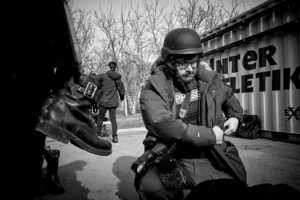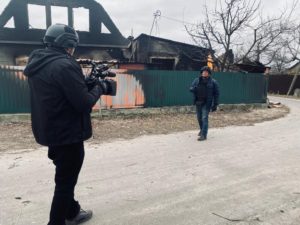If you find war coverage ‘disturbing’…
“Warning: viewers may find some of the images in this report disturbing.” Can there be a more pointless and insensitive caveat to a story about the civilian victims of war? You are supposed to be disturbed by war and suffering. The journalists who capture those images often take horrendous physical and psychological risks. So why do they do it, even though their bosses tell viewers to look away?
Sir Winston Churchill, a war correspondent long before he was a wartime leader, famously noted that: “Nothing in life is so exhilarating as to be shot at without result.”
The flash, crash and roiling smoke of bomb and missile strikes are powerful, essential images in war coverage. And adrenalin can be a addictive.
But it’s not the be all and end all. Yes, there are what are termed “war junkies”. But they are in the minority.
Nick Turner, one of the most gifted, sensitive and brave cameramen I ever had the privilege to work with, summed it up this way: “The job of being a traveling news cameramen chooses us, not the other way around. It finds those interested enough in the world to sacrifice family life and security, who are prepared to go to awful places in the middle of the night for the news.”
And the job comes at a price.
Every terrible, heart-wrenching, gut-twisting scene they point their camera at doesn’t just go directly onto videotape. It sears its way through the viewfinder and straight into their brain and psyche and soul. Nick Turner says covering pretty much every war was there during his forty-five year career left him“with what I guess is mild PTSD. I can’t watch movies and news about children suffering, for example.”
It’s a safe bet Ukraine will provide a surfeit of that.
STRIKING SCENES
BBC cameraman Jon Hughes just finished a seven-week rotation:
“I grew up hearing stories of London in the blitz with people taking shelter in the underground, and here we were in the 21st century with people living in exactly the same conditions.

This is a part of the job which always gives me thought. You’re there to record what is going on…to depict the true horror of the situation. But these are real people, at their worst moment, at their most vulnerable, and you have to film that. You try and do it sensitively, but to some extent it does feel like exploitation. If people object to being filmed, I always put the camera down. What amazes me is how in these circumstances, people do let you film them. They often want you to show the world what is going on, the injustice and suffering that they’re experiencing.”
If the camera isn’t there, how would anyone know? Or care? The obvious answer is — they wouldn’t.
Federico Pucci, an Italian cameraman, was struck by the courage and fortitude of the Ukrainian people.
“At the Polish border, I filmed a father getting out of a car with a small trolley bag and a backpack. His wife was holding the hand of their disabled daughter. They were heading for safety. He would go back to fight. They didn’t cry. War is not for the weak.”
A DIFFERENT KIND OF ‘SHOCK AND AWE’
Freelance cameraman James Butler has covered the wars in Syria, Iraq, Afghanistan and at the time of writing was in Kyiv.

“It always amazes me how quickly a person, city or country becomes accustomed to war. You get used to the explosions, loud noises and unsocial hours. But one thing I don’t think, or hope, I’ll ever get used to is the amount of human suffering you’re exposed to. You’re always questioning — when do you point the camera or when do you allow people their dignity and refuse to film them at their lowest and most desperate times. I never get used to it, and for months after always question if I made the right call.”
Thorsten Hoefle, a German cameraman for CBS, summed up Ukraine and all the other wars and human tragedy he’s covered this way:
“You feel sad. You get teary eyes. Your viewfinder fogs up. You have a feeling of guilt that you are filming people in terrible situations, in their weakest moment. You’re aware that you are only visiting and get to go home to a safe place, a hotel, with food, normally running water and electricity, while they can’t escape the horrors of war. And yet you feel it’s important that these pictures are taken. So that the world can see them. That politicians can see them. Even if it doesn’t always make a difference, we have to keep on trying. If we don’t show the brutality, the sadness, nothing will change, will get stopped, people won’t feel like they need to donate to help.”
The writer Marguerite Duras synthesised all of the foregoing in three lines: “Journalism without a moral position is impossible. Every journalist is a moralist. It’s absolutely unavoidable.”
In many ways the ones truest to that are the men and women you don’t see, but who see everything for you, through their viewfinders…and hearts.
And you damned well should be disturbed by it.
Comments are welcomed. Click CONTACT on the site header.
To receive e‑mail alerts to new posts, Click SIGN-UP on the header.
5 thoughts on “If you find war coverage ‘disturbing’…”
Dearest Pizz how well I remember such conversations all those years ago, I often think of them. When we were in Normandy a few years ago we visited the memorial to journalists killed in action, in Caen. It’s so moving and thought-provoking. And as for being disturbed, it feels unbearably disrespectful to look away.
Thanks Barb. Several of my colleagues and friends are commemorated by that memorial…including Paul Douglas and James Brolan.
i am puzzled why many of us
consider our
best days being spent covering
the worst events…
???
Well, we could get philosophical on that one, but I think the simple answer is because when we do it we’re with people we like and trust and we feel like we’re making a difference…and…we’ve all got a screw or two loose…
i list
survival and often survivor guilt…
“yeah, i made it, but…”
historical perspective…
“our story(ies) made a difference”…
seldom really true and that brings us to
ego…“yeah, I was there, it was something”…
kinda jaundiced on my part…
but I really like and I do agree with your answer,
particularly the screwy part…